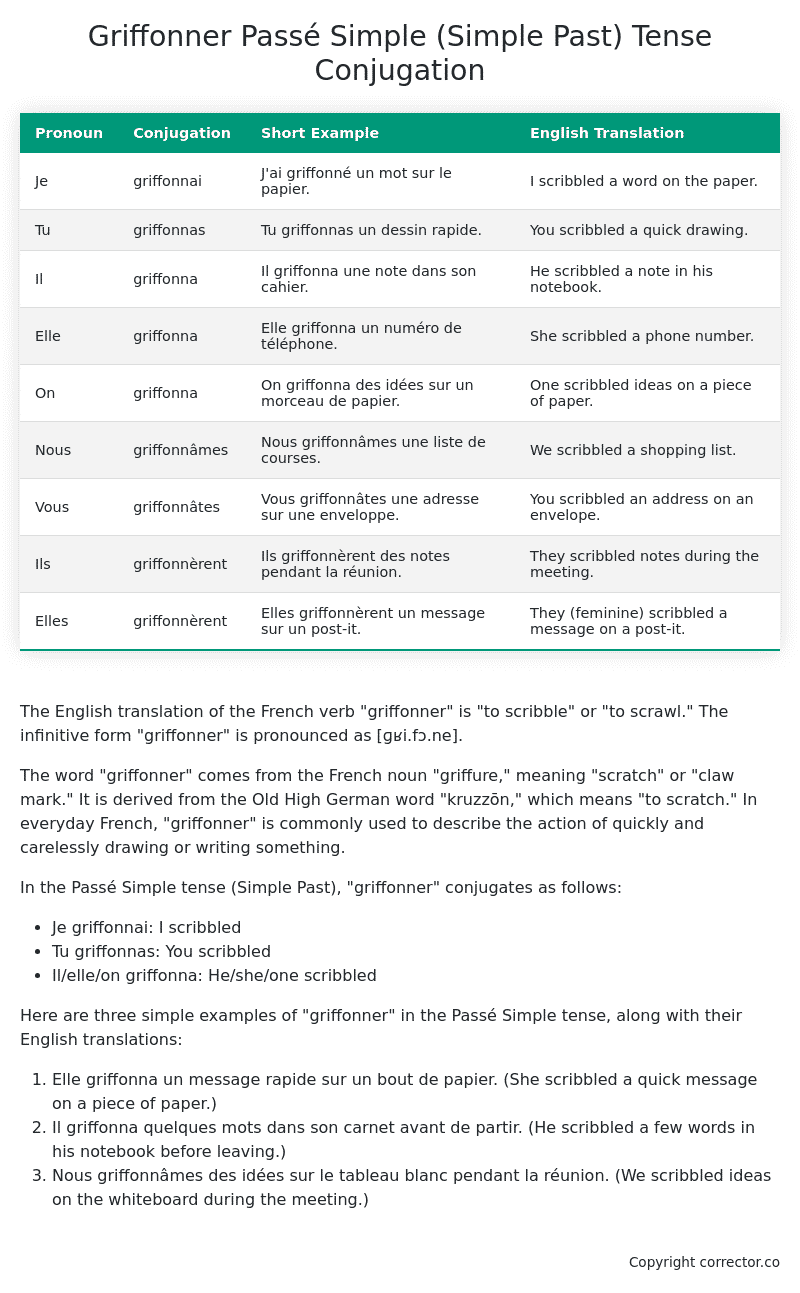Passé Simple (Simple Past) Tense Conjugation of the French Verb griffonner
Introduction to the verb griffonner
The English translation of the French verb “griffonner” is “to scribble” or “to scrawl.” The infinitive form “griffonner” is pronounced as [ɡʁi.fɔ.ne].
The word “griffonner” comes from the French noun “griffure,” meaning “scratch” or “claw mark.” It is derived from the Old High German word “kruzzōn,” which means “to scratch.” In everyday French, “griffonner” is commonly used to describe the action of quickly and carelessly drawing or writing something.
In the Passé Simple tense (Simple Past), “griffonner” conjugates as follows:
- Je griffonnai: I scribbled
- Tu griffonnas: You scribbled
- Il/elle/on griffonna: He/she/one scribbled
Here are three simple examples of “griffonner” in the Passé Simple tense, along with their English translations:
- Elle griffonna un message rapide sur un bout de papier. (She scribbled a quick message on a piece of paper.)
- Il griffonna quelques mots dans son carnet avant de partir. (He scribbled a few words in his notebook before leaving.)
- Nous griffonnâmes des idées sur le tableau blanc pendant la réunion. (We scribbled ideas on the whiteboard during the meeting.)
Table of the Passé Simple (Simple Past) Tense Conjugation of griffonner
| Pronoun | Conjugation | Short Example | English Translation |
|---|---|---|---|
| Je | griffonnai | J’ai griffonné un mot sur le papier. | I scribbled a word on the paper. |
| Tu | griffonnas | Tu griffonnas un dessin rapide. | You scribbled a quick drawing. |
| Il | griffonna | Il griffonna une note dans son cahier. | He scribbled a note in his notebook. |
| Elle | griffonna | Elle griffonna un numéro de téléphone. | She scribbled a phone number. |
| On | griffonna | On griffonna des idées sur un morceau de papier. | One scribbled ideas on a piece of paper. |
| Nous | griffonnâmes | Nous griffonnâmes une liste de courses. | We scribbled a shopping list. |
| Vous | griffonnâtes | Vous griffonnâtes une adresse sur une enveloppe. | You scribbled an address on an envelope. |
| Ils | griffonnèrent | Ils griffonnèrent des notes pendant la réunion. | They scribbled notes during the meeting. |
| Elles | griffonnèrent | Elles griffonnèrent un message sur un post-it. | They (feminine) scribbled a message on a post-it. |
Other Conjugations for Griffonner.
Le Present (Present Tense) Conjugation of the French Verb griffonner
Imparfait (Imperfect) Tense Conjugation of the French Verb griffonner
Passé Simple (Simple Past) Tense Conjugation of the French Verb griffonner (You’re reading it right now!)
Passé Composé (Present Perfect) Tense Conjugation of the French Verb griffonner
Futur Simple (Simple Future) Tense Conjugation of the French Verb griffonner
Futur Proche (Near Future) Tense Conjugation of the French Verb griffonner
Plus-que-parfait (Pluperfect) Tense Conjugation of the French Verb griffonner
Passé Antérieur (Past Anterior) Tense Conjugation of the French Verb griffonner
Futur Antérieur (Future Anterior) Tense Conjugation of the French Verb griffonner
Subjonctif Présent (Subjunctive Present) Tense Conjugation of the French Verb griffonner
Subjonctif Passé (Subjunctive Past) Tense Conjugation of the French Verb griffonner
Subjonctif Imparfait (Subjunctive Imperfect) Tense Conjugation of the French Verb griffonner
Subjonctif Plus-que-parfait (Subjunctive Pluperfect) Tense Conjugation of the French Verb griffonner
Conditionnel Présent (Conditional Present) Tense Conjugation of the French Verb griffonner
Conditionnel Passé (Conditional Past) Tense Conjugation of the French Verb griffonner
Conditionnel Passé II (Conditional Past II) Tense Conjugation of the French Verb griffonner
L’impératif Présent (Imperative Present) Tense Conjugation of the French Verb griffonner
L’impératif Passé (Imperative Past) Tense Conjugation of the French Verb griffonner
L’infinitif Présent (Infinitive Present) Tense Conjugation of the French Verb griffonner
L’infinitif Passé (Infinitive Past) Tense Conjugation of the French Verb griffonner
Le Participe Présent (Present Participle) Tense Conjugation of the French Verb griffonner
Le Participe Passé (Past Participle) Tense Conjugation of the French Verb griffonner
Struggling with French verbs or the language in general? Why not use our free French Grammar Checker – no registration required!
Get a FREE Download Study Sheet of this Conjugation 🔥
Simply right click the image below, click “save image” and get your free reference for the griffonner Passé Simple tense conjugation!

Griffonner – About the French Passé Simple (Simple Past) Tense
Formation
Usage
Narration
Historical Context
Interactions with other tenses
Passé Composé
Imparfait
Conditional and Subjunctive
Summary
I hope you enjoyed this article on the verb griffonner. Still in a learning mood? Check out another TOTALLY random French verb conjugation!


